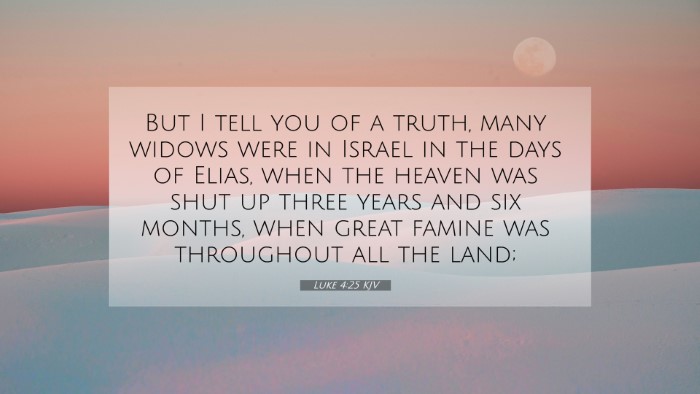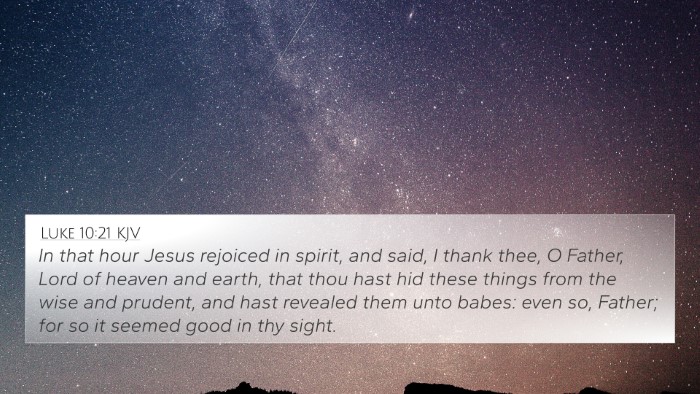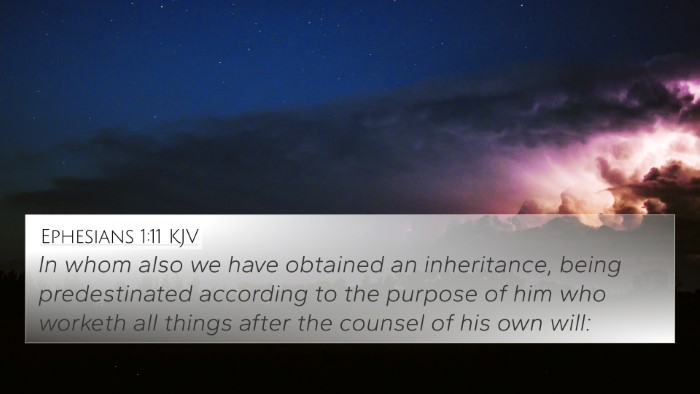Understanding Luke 4:25
Luke 4:25 states: "But I tell you truly, many widows were in Israel in the days of Elijah when the heaven was shut up three years and six months, and there was a great famine throughout all the land."
Summary of Meaning
This verse is part of a larger narrative where Jesus, in the synagogue of Nazareth, refers to the prophetic ministry of Elijah to illustrate God's favor towards those outside Israel. The mention of widows and the famine serves to highlight Israel's unfaithfulness and God's willingness to reach out to the Gentiles. Here, Jesus establishes a significant theological point about God's grace and mercy that transcends ethnic and religious boundaries.
Commentary Insights
- Matthew Henry's Commentary
Matthew Henry emphasizes that this passage illustrates God's judgment on Israel due to their disobedience while highlighting His mercy towards the Gentiles. The reference to widows signifies vulnerability and denotes that even the marginalized were recipients of God's grace, reflecting a theme of divine sovereignty in choosing recipients of His blessings.
- Albert Barnes' Notes
Barnes points out that the famine signified a period of suffering during Elijah's ministry, showcasing the severe consequences of Israel’s idolatry. This historical account not only reveals God's sovereign power over nature but also serves as a prophetic foreshadowing of the rejection of Jesus by Israel, calling attention to the inclusivity of God's kingdom.
- Adam Clarke's Commentary
Clarke elaborates on the cultural significance of widows during Elijah's time, underscoring their social standing and the implications of God providing care for them. He draws connections between Elijah's ministry and the mission of Jesus, portraying Jesus as the fulfillment of the prophecies regarding liberation and salvation that extend beyond Israel.
Bible Cross-References
This verse can be connected to various other scriptures that reinforce its themes:
- 1 Kings 17:9-16 - The account of Elijah and the widow of Zarephath.
- James 5:17 - Discusses Elijah's prayer affecting the weather.
- Luke 4:26 - Jesus references Naaman, the Syrian, reinforcing the theme of God's favor toward Gentiles.
- Romans 11:11 - Paul addresses the Gentiles being grafted into the promise.
- Isaiah 61:1-2 - Prophecy of God's favor and liberation, resonating with Jesus' mission.
- Matthew 15:24 - Jesus identifies his ministry primarily to the lost sheep of Israel.
- Ephesians 2:11-13 - Discusses Gentiles being brought near through Christ.
- Luke 7:11-17 - Jesus raises a widow's son, emphasizing compassion towards widows.
- Acts 10:34-35 - Peter acknowledges that God shows no partiality, reaffirming inclusivity.
- Matthew 21:43 - Jesus warns that the kingdom will be taken away from those unfaithful.
Thematic Connections
Luke 4:25 opens up an array of themes relevant to a comparative Bible verse analysis:
- The grace of God towards the marginalized
- The sovereignty of God amidst human disobedience
- The fulfilled prophecies concerning the Messiah
- Inclusivity of God’s kingdom for both Jews and Gentiles
- The role of prophecy in understanding Jesus’ mission
Using Cross-References for Deeper Understanding
Understanding the connections between Bible verses enhances one's grasp of theological concepts. Engaging in cross-referencing allows for:
- Identifying relationships. Observing how themes resonate across different biblical texts.
- Contextual interpretation. Amplifying meanings by considering the contexts of different scriptures.
- Enhanced sermon preparation. Cross-referencing can support preaching and teaching through diverse perspectives.
Conclusion
In Luke 4:25, Jesus addresses themes of divine judgment and grace, provoking thought on God’s outreach beyond Israel. This verse not only stands alone but interlinks with a rich tapestry of scripture that reflects God’s commitment to salvation for all humanity, transcending traditional boundaries. Therefore, ongoing study and cross-referencing are instrumental in fully appreciating the depth and breadth of biblical messages.













